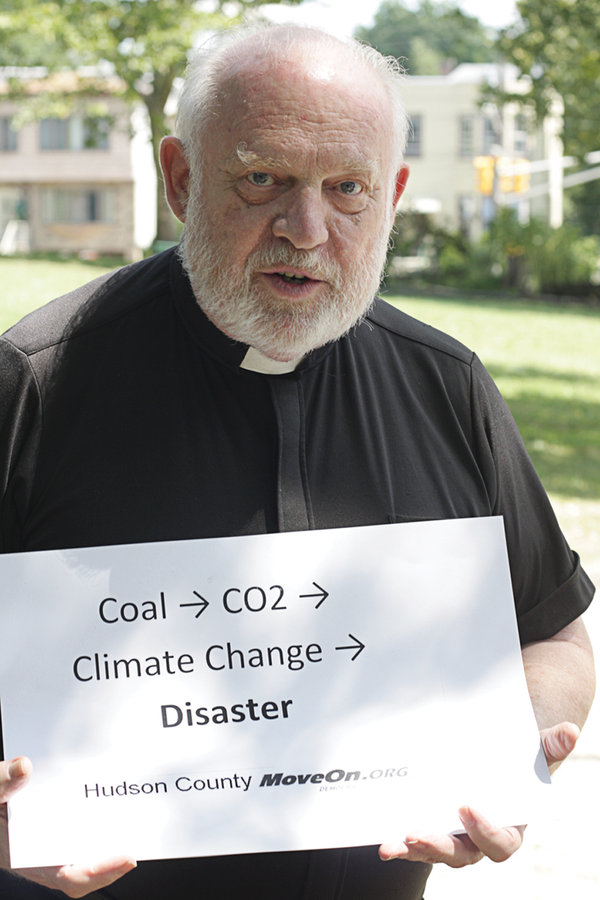Pat Hilliard and Mike Ruscigno came from Bayonne to Jersey City’s Leonard Gordon Park last Tuesday bearing signs in support of President Barack Obama’s Clean Power Plan.
As members of the Bayonne Nature Club, Hilliard and Rusciagno were concerned, calling the coal-powered PSEG Hudson Generating Station power plant in Jersey City off in the distance one of the most polluting in the nation.
“We’ve had scrubbers technology since the 1970s and the plant is still not using them,” Hilliard said, holding up anti-pollution protest signs.
Deanle and Eugene Scott came all the way from West Orange to protest as well. Both were originally from Jersey City. In fact, Brown had worked as a painter at the power plant when he was younger.
“That was back in 1976,” he said, noting that he was one of a number of people the Sierra Club had contacted to show support for the president’s initiative, which calls for the development of stricter plans for reducing climate altering emissions by 2017, and an end to coal-burning for power plants by 2030.
Since 1906, The Hudson Generating Station has occupied 250-acres north of the intersection of Duffield and Van Keuren Avenues on the east bank of the Hackensack River.
A new stricter plan for emissions
Mayor Steven Fulop joined the New Jersey Sierra Club — and a diverse coalition of community leaders in the hilltop park overlooking the power plant — to support Obama’s plan that would call for a 32 percent reduction of carbon emissions from 2005 levels by 2030.
This is a much more aggressive proposal than other plans previously proposed.
The Obama Administration’s Clean Power Plan allows states like New Jersey to implement a protocol to reduce greenhouse gas emission and help mitigate climate change by requiring states to eradicate dirty fossil fuel plants.
“In Jersey City, we haven’t waited for action at the state or federal level, but have taken significant steps to reduce our carbon footprint as we understand firsthand the impact felt by climate change.” – Mayor Steven Fulop
____________
Fulop said New Jersey plants are mostly fueled by natural gas or nuclear power.
Jeff Tittel, director of the New Jersey chapter of the Sierra Club, called Obama’s new rules “a game changer” in that it will become the first significant step by the United States to deal with climate change.
The $84 billion plan, which does not require congressional approval, would give New Jersey two years to prepare a state plan.
Opposed by Christie
Gov. Christopher Christie opposes the new rules, and the New Jersey Department of Environmental Protection Agency has said it would not comply, despite the federal mandate.
The Clean Power Plan, Tittel said, will not only slow down climate change by reducing pollution, but will also force plants like the Hudson station to close.
“These rules are a game changer,” Tittel said. “For a state like New Jersey that has been devastated by climate change, this will protect us from future issues associated with sea level rise, while also growing our economy through energy efficiency and with green jobs.”
This could mean New Jersey would see as much as a 50 percent drop in power plant pollution, if Obama’s plan is adopted.
Scott said even the Hudson plant isn’t complete coal any more, but a combination, which would make it easier to eliminate the coal and still operate the facility.
Coal-fueled plants also have a significant local impact on health, Fulop said, noting that these facilities are usually located in impoverished areas and contributed to a number of respiratory ailments. One report by a not-for-profit called “Toll from Coal” estimated that 531 people in New Jersey die each year from coal-related deaths. Coal also contributes to 445 hospital admissions yearly, and is connected to about 987 heart attacks.
The Environmental Protection Agency evaluation of the president’s plan said that it will protect health nationally by reducing by 25 percent of the pollutants that contribute to the soot and smog that made people sick.
Father Dave Stump, a member of Hudson County Move.org, said it is important to stop this pollution from affecting local residents.
Al Sullivan may be reached at asullivan@hudsonreporter.com.
